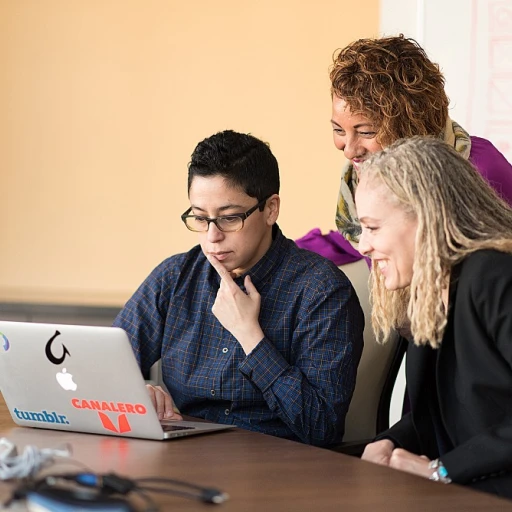Defining the Peer Support Specialist Role
Clarifying the Position of a Support Specialist
The role of a Peer Support Specialist is gaining traction within the mental health and substance abuse fields as an indispensable part of recovery support teams. This position entails offering personal experiences and sharing lived knowledge, which provides invaluable support to individuals navigating their own recovery journey. A Peer Support Specialist leverages their own experiences with mental illness or substance use challenges to foster hope and unlock potential in others.
Operating within behavioral health settings, these support specialists focus on building trust and rapport, which empowers individuals to take meaningful steps toward recovery. The role is not limited to direct interaction; it also involves navigating and linking persons to the appropriate health services and community resources essential for their recovery process. This peer-led support is unique because it emphasizes empathy and mutual understanding, qualities that are crucial when working with people who might be hesitant to engage in traditional health services.
By providing nonclinical support services, Peer Support Specialists help reduce stigma and offer a safe space for individuals to disclose personal experiences. This collaborative approach to recovery can significantly aid in normalizing the challenges of mental illness and substance abuse, ultimately leading to a more community-based support network.
For those interested in how such positions foster a collaborative work environment, exploring affordable ways to boost employee engagement could provide additional insights into creating supportive employee experiences across various sectors.
Essential Skills for a Peer Support Specialist
Essential Abilities for Social Support Work
Being a peer support specialist demands a unique blend of experience, technical skills, and personal attributes. These professionals play a crucial role in the recovery process, particularly for individuals facing challenges related to mental illness or substance abuse. Here’s what makes a support specialist stand out:
- Communication Skills: A peer specialist needs excellent communication abilities to disclose personal stories effectively, offering emotional and recovery support while fostering an open and trusting environment. This is essential to promote positive behavioral health outcomes.
- Empathy and Understanding: To build rapport and provide genuine peer support, specialists need to empathize deeply with individuals in recovery, often drawing on their own experiences as a navigational tool.
- Problem-solving and Decision-making: The ability to think critically and make thoughtful decisions can significantly enhance the support services provided. It helps in determining the appropriate resources and strategies needed for different situations.
- Training Technical Skills: A balance of technical knowledge and practical experience is necessary for offering effective service. This includes understanding mental health services, recovery programs, and community resources thoroughly.
- Coping Mechanisms: Specialists should not only guide others but must also have personal coping strategies to manage their own mental health. It's crucial to maintain their well-being during periods of full-time employment with intense emotional labor.
- Certified Training: Acquiring certification in areas pertinent to peer recovery can boost one's qualifications, equipping them with the necessary skills to provide comprehensive support services. Ongoing training and technical knowledge improvements are critical for enhancing the peer recovery landscape.
- Motivational Skills: A peer support specialist should motivate and encourage individuals throughout the recovery journey, influencing their behavior positively and contributing to successful outcomes.
As the field of peer support continues to evolve, so do the expectations and qualifications relevant to this crucial role. A Specialist must engage in continuous development to meet the dynamic demands of the job, which includes staying informed through resources like
navigating the complexities of remote work training and development. These are instrumental in providing the support needed to make an impactful difference in behavioral health settings.
Training and Qualifications
Gaining Qualifications to Support Recovery
To become an effective peer support specialist, acquiring the proper training and qualifications is essential. This role involves working closely with individuals facing mental health challenges or substance abuse issues. Ensuring that specialists are properly equipped to aid in the recovery process is important not only for individual clients but also for the integrity of community and behavioral health services.
- Certification Programs: Certified peer specialist programs often require participants to undergo state-approved training. This helps to align them with the standards and practices necessary for success in supporting mental illness and addiction recovery. Various states offer specific certifications that focus on personal experience and knowledge of local resources.
- Clinical Knowledge and Experience: While direct clinical responsibility might not be part of the peer support specialist's job, having a foundational understanding of behavioral health concepts can be beneficial. Familiarity with clinical terminology, intervention strategies, and data around mental health and substance intervention processes can enhance the capacity to provide effective support services.
- Professional Development: Keeping up with advances in behavioral health through training and development opportunities is critical. Whether through workshops, seminars, or online courses, ongoing education ensures that peer specialists remain adept at adapting to new challenges and resources.
- Technical Assistance: Developing skills in using relevant technology and software can be advantageous, particularly for roles involved in providing telehealth services or those requiring comprehensive documentation and communication within health service networks.
Being a peer support specialist is not just about having lived experience; it requires a structured and knowledgeable approach to recovery support. Enthusiasm for training ensures that specialists can offer the best support throughout the recovery process, blending first-hand understanding with professional acumen.
The Hiring Process for Peer Support Specialists
Steps in Hiring a Peer Support Specialist
The hiring process for a peer support specialist is a crucial step in ensuring the right individuals are available to provide support services effectively. This role requires a deep understanding of the recovery process, a personal experience with mental health or substance abuse challenges, and the ability to connect with others on their journey towards recovery.
The initial step in hiring involves identifying job requirements and qualifications specific to the role. For this, service providers often seek individuals who have personal lived experience with mental illness or substance abuse, as this can be invaluable in offering empathy and authentic support.
Once the job description is crafted, service providers typically advertise the position through various channels, such as community centers, health services, and online job platforms. Considering the sensitive nature of the role, it is also essential for candidates to understand the importance of privacy and when to disclose personal experiences in professional settings.
The interview phase is tailored to assess the candidate's ability to engage with the community and provide effective peer support. Employers often look for individuals who exhibit strong communication and interpersonal skills essential for behavioral health environments.
Post-interview, many organizations prefer candidates who have undergone some form of training technical or are certified peer specialists. This ensures they have the required skills to deliver recovery support and are familiar with available resources.
Hiring a peer support specialist is not merely filling a vacancy; it is about enriching the peer recovery networks within the community. By selecting individuals who resonate with the values of support, service, and recovery, organizations can enhance their programs and provide better assistance to those on their recovery journey.
Challenges and Rewards of the Job
Overcoming Hurdles and Reaping Benefits
The hiring journey for peer support specialists is not without its unique set of challenges and rewards. Understanding these aspects can significantly impact both candidates and the organizations that employ them.
The nature of the job in mental health and substance abuse recovery places high demands on emotional resilience and patience. Peer support specialists often deal with individuals during their most vulnerable times, providing guidance and empathy while being mindful of maintaining professional boundaries. Many specialists have personal experiences with mental health challenges, which can be a double-edged sword. While this personal journey equips them with unparalleled empathy and insight, it can also serve as a source of emotional strain. It is crucial for organizations to offer robust support systems and resources to assist in managing these pressures.
Support services and behavioral health organizations often navigate budget constraints and varying program priorities, which can hinder the ability to expand peer support programs or invest in substantial training and professional development. Facing these financial constraints might require innovative solutions, like fostering community partnerships or accessing grant funding. This is particularly important to ensure that peer specialists remain equipped with the necessary skills and technical knowledge, alongside their lived experience, to provide effective recovery support.
The job's rewarding aspect often lies in witnessing the tangible impact of their work. Certified peer specialists not only contribute to the recovery process but also help decrease stigma around mental illness and substance abuse. Their contributions can be integral to improving overall mental health services and encouraging a more inclusive approach towards behavioral health.
Moreover, peer support roles can offer a sense of personal and professional fulfillment, as specialists see firsthand the positive changes they help initiate in others' lives. This profound impact can foster a strong sense of community and belonging, both in their professional circles and the communities they serve.
Navigating challenges and savoring the rewarding moments require a balance of personal resilience and organizational support. Therefore, both candidates and service providers must remain committed to prioritizing mental health and behavioral well-being in every aspect of peer support services.
Future Trends in Peer Support
Anticipating Future Developments in Peer Support
As we look towards the future, the landscape of peer support roles is expected to evolve significantly, aligned with advancements in mental health and behavioral health services. There's a growing emphasis on integrating peer support into broader health systems, recognizing its potential to bolster recovery processes.
One future trend involves the expansion of peer support services into diverse community settings beyond traditional mental health services. As these settings diversify, the demand for peer support specialists capable of providing tailored support and recovery assistance within different cultural contexts will rise. This calls for adaptive training programs that equip peers with skills relevant to unique community needs.
Technological Integration
With technology's pervasive influence, the integration of digital tools and platforms will play a crucial role in shaping the peer support landscape. Support specialists may increasingly leverage virtual platforms to connect with individuals, offering virtual support groups and one-on-one digital interactions to reach wider audiences, including those in remote areas. The adoption of mental health apps can further enhance accessibility to support resources.
Evolving Training and Certification
Training and qualifications for certified peer specialists are also expected to advance, incorporating more comprehensive training modules focusing on digital literacy and the use of technology to facilitate recovery support. Continuing education will likely become a standard requirement, ensuring that peer support professionals remain up-to-date with evolving best practices and innovative support mechanisms.
Enhanced Data Utilization
Data-driven approaches will increasingly inform peer support programs. Collecting and analyzing relevant recovery data can provide insights into the effectiveness of support interventions, enabling specialists and service providers to refine programs for better outcomes. This emphasis on evidence-based practice ensures that peer support continues to provide measurable benefits to individuals navigating substance abuse, mental illness, and behavioral health challenges.
In this dynamic field, challenges persist, such as the need to balance technological integration with personal connections and maintaining the authenticity of peer relationships. However, the prospects for peer support continue to grow, promising enriching experiences and substantial contributions to the broader mental health ecosystem.









